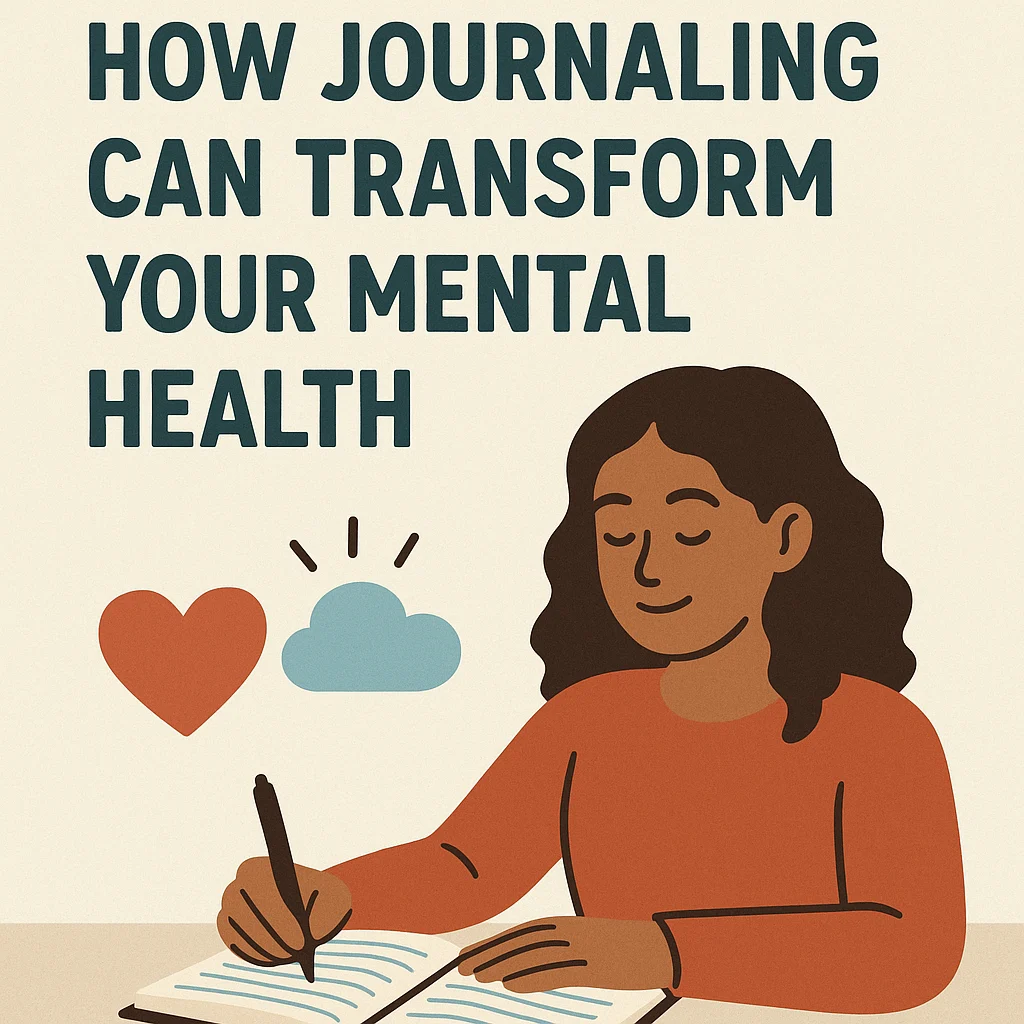The act of writing is turning out to be one of the most effective strategies for emotional clarity and wellbeing in a fast-paced world full of incessant notifications, emotional noise, and growing mental health issues. From Marcus Aurelius to contemporary psychologists, journaling is a timeless habit that provides more than just a means of documenting everyday occurrences. It is a scientifically supported therapeutic approach that can greatly improve your mental well-being.
This guide will show you how journaling can become your daily dose of healing, growth, and peace, whether you're trying to manage stress, cope with anxiety, explore your thoughts, or find clarity.
The Psychology Behind Journaling
Fundamentally, journaling is an expressive writing technique that involves putting our innermost feelings, ideas, and experiences into words. But why is it beneficial?
1. Emotional Processing
Writing compels us to take a moment to notice our feelings. Journaling helps us identify and analyze our emotions, which helps us better control them rather than feeling overwhelmed.
According to Dr. James Pennebaker, a pioneer in expressive writing research, journaling about emotional experiences can reduce stress, improve immune function, and enhance psychological well-being.
2. Cognitive Organization
We frequently have cluttered minds. We can arrange our disorganized thoughts into coherent stories by keeping a journal. This increases self-awareness and makes harmful thought patterns easier to spot.
A 2018 study published in JMIR Mental Health found that people who journaled daily experienced increased mindfulness and reduced mental distress.
3. Stress and Anxiety Reduction
Journaling helps you relax and regain a logical perspective by decreasing activity in the brain's fear center, the amygdala.
In fact, researchers at the University of Chicago found that writing about stress before an exam helped students perform better.
4. Goal Clarity and Motivation
Your brain starts organizing your actions toward reaching your goals or dreams when you write about them. Your intentions become more concrete through a process known as encoding.
Proven Mental Health Benefits of Journaling
Here are just a few of the powerful ways journaling can positively impact your mind and emotions:
🧠 1. Reduces Symptoms of Anxiety and Depression
Regular journaling can provide a non-judgmental space to express fear, guilt, or sadness.
-
According to a study published in the Journal of Affective Disorders, adults who wrote expressively experienced fewer symptoms of depression.
-
According to a different study, gratitude journaling significantly reduced symptoms of Generalized Anxiety Disorder (GAD).
❤️ 2. Improves Emotional Intelligence
By assisting you in better understanding your emotions, triggers, and behavioral patterns, journaling increases emotional intelligence (EQ). You get better at handling relationships and social stress the more you think about it.
😴 3. Enhances Sleep Quality
Insomnia is caused by overthinking at night. However, research indicates that putting concerns or a to-do list in writing before bed can shorten the time it takes for sleep to start and encourage deeper sleep.
🧘 4. Promotes Mindfulness and Presence
By keeping a journal, you can train your brain to be in the present rather than ruminate on the past or worry about the future. It fortifies your brain's prefrontal cortex, which is responsible for rational thought.
🧭 5. Helps with Trauma Recovery
One useful technique in trauma therapy is journaling. It enables people to reframe their experiences, process pain, and rebuild their personal narratives.
Trauma experts, including Bessel van der Kolk, encourage expressive writing as a form of self-directed healing.
Types of Journaling Techniques for Mental Health
Not all journaling looks the same. Here are the most effective types for emotional wellness:
✍️ 1. Free Writing or Stream of Consciousness
For a predetermined amount of time, you write whatever comes to mind in this unstructured format.
Purpose: Emotional release, subconscious discovery, self-exploration.
How to start:
-
Set a timer for 10–15 minutes.
-
Write without editing or judging.
-
Let thoughts flow, even if they seem messy.
🙏 2. Gratitude Journaling
You can change your perspective from one of scarcity to abundance by writing down three to five things for which you are thankful each day.
Benefits:
-
Enhances positivity
-
Lowers stress hormones
-
Improves long-term life satisfaction
🎯 3. Goal and Intentions Journal
You can better align your daily routine with your larger purpose by writing down your short- and long-term goals.
Example prompts:
-
“What do I want to achieve this week?”
-
“What small action can I take today?”
🧠 4. Cognitive Behavioral Journaling (CBT)
Writing about circumstances, ideas, emotions, and actions is a therapeutic technique for altering unfavorable thought patterns.
CBT format:
-
What happened?
-
What did I think?
-
What did I feel?
-
What could I think instead?
📚 5. Prompt-Based Journaling
Structured prompts help guide self-reflection. Some examples include:
-
“What emotion have I been avoiding?”
-
“What does my inner critic sound like?”
-
“What would I say to a friend feeling this way?”
💡 6. Mood Tracking Journal
Track your daily mood and habits (sleep, exercise, food, social interactions) to identify emotional triggers and patterns.
Apps like Daylio or Reflectly offer digital mood journals with built-in analytics.
How to Start (And Stick to) a Journaling Habit
The key to true transformation is consistency, but starting is easy. To develop the habit, follow these steps:
🗓️ 1. Pick a Time and Stick to It
Many people journal:
-
First thing in the morning (to clear mental clutter)
-
Before bed (to process the day and relax)
Even 5–10 minutes is enough.
📝 2. Choose Your Medium
-
Traditional notebook (e.g., Moleskine or bullet journal)
-
Digital journaling apps (e.g., Journey, Notion, Penzu)
-
Voice journaling (record thoughts out loud if writing feels restrictive)
🧠 3. Don’t Judge Your Writing
Your journal isn't supposed to be flawless. Proper grammar and complete sentences are not necessary. Honest expression, not performance, is what matters.
🔁 4. Use Prompts When You’re Stuck
Keep a list of prompts handy to break writer’s block. Some favorites:
-
“Today, I feel…”
-
“What am I avoiding?”
-
“What do I need more of in my life?”
✅ 5. Make It Rewarding
Pair journaling with something you enjoy:
-
A cup of coffee
-
Background music
-
A cozy nook
This creates a positive habit loop: cue, action, reward.
Journaling Success Stories
You are among good people. Journaling is credited by many therapists, entrepreneurs, and creatives as a game-changer.
🌟 Emma Watson (Actress)
She has spoken openly about using journaling to navigate anxiety and stay grounded in her busy life.
📘 Tim Ferriss (Author of The 4-Hour Workweek)
combines 5-minute journaling sessions with morning pages to help him become more focused and intentionally plan his day.
💬 Therapists Worldwide
Journaling can be used to help clients develop emotional resilience and insight in CBT, DBT, and mindfulness-based therapies.
Final Thoughts: Your Mental Health Journal is a Safe Place
Your journal is one space that is wholly yours in a world where so much is beyond your control. It serves as your sanctuary, your brainstorming board, your therapist, and your mirror.
By journaling regularly, you will:
-
Understand yourself better
-
Calm your anxiety
-
Develop healthier thinking patterns
-
Track your growth over time
Mental health is a process rather than a final goal. Additionally, one of the most effective tools you can use on the journey is journaling.
So start today. Write one sentence. Then another. Your mental clarity is waiting.



